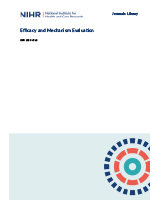This work was produced by Sharp et al. under the terms of a commissioning contract issued by the Secretary of State for Health and Social Care. This is an Open Access publication distributed under the terms of the Creative Commons Attribution CC BY 4.0 licence, which permits unrestricted use, distribution, reproduction and adaptation in any medium and for any purpose provided that it is properly attributed. See: https://creativecommons.org/licenses/by/4.0/. For attribution the title, original author(s), the publication source – NIHR Journals Library, and the DOI of the publication must be cited.
NCBI Bookshelf. A service of the National Library of Medicine, National Institutes of Health.
Sharp A, Cornforth C, Jackson R, et al. The efficacy of sildenafil therapy in dismal prognosis early-onset intrauterine growth restriction: the STRIDER RCT. Southampton (UK): National Institute for Health and Care Research; 2024 Oct. (Efficacy and Mechanism Evaluation, No. 11.18.)

The efficacy of sildenafil therapy in dismal prognosis early-onset intrauterine growth restriction: the STRIDER RCT.
Show detailsThe STRIDER UK study was designed to answer the following objectives in two phases: phase 1 – recruitment to a randomised controlled trial of sildenafil versus placebo for the treatment of early-onset intrauterine fetal growth restriction, and phase 2 – follow-up at 2 years of age to assess how cardiovascular and neurodevelopmental outcomes effect the surviving infants.
The primary objective of the phase 1 study was to determine whether sildenafil, compared to placebo therapy, delays the need to deliver a severely growth-restricted fetus by a minimum of 1 week.
The secondary objectives were as follows:
- To investigate the impact on fetal growth and fetal well‐being by comparing differential effect on vascular resistance in the uterine arteries, umbilical, fetal middle cerebral artery and fetal ductus venosus and differences in birthweight centiles in infants treated in utero with sildenafil and placebo.
- To examine, through collaboration with an international consortium, the hypothesis that sildenafil therapy compared to placebo therapy increases the rate of infant survival free of major neurodisability.
- To report frequency of adverse and serious adverse events (SAEs) associated with sildenafil use.
- To investigate the impact on maternal cardiovascular parameters by measurements of maternal heart rate and peripheral blood pressure (BP) before and after administration of study medication.
- To elucidate the precise mechanism and location of action of sildenafil in pregnancy by investigating the effects of sildenafil therapy on omental (representative of the wider maternal systemic vasculature), myometrial (uterine vasculature) and chorionic plate artery (placental vasculature) reactivity.
The objective of the phase 2 follow-up study was to examine neurodevelopmental and cardiovascular outcomes at 2 years of age in children born to mothers who received sildenafil compared with placebo during pregnancy.
It was hypothesised that:
- STRIDER UK children whose mothers received sildenafil will have improved neurodevelopmental outcomes at age 2–3 years (corrected) compared with controls exposed to placebo.
- There will be no difference in BP at 2–3 years (corrected) between STRIDER UK children whose mothers received sildenafil compared with controls exposed to placebo.
- Objectives - The efficacy of sildenafil therapy in dismal prognosis early-onset ...Objectives - The efficacy of sildenafil therapy in dismal prognosis early-onset intrauterine growth restriction: the STRIDER RCT
Your browsing activity is empty.
Activity recording is turned off.
See more...